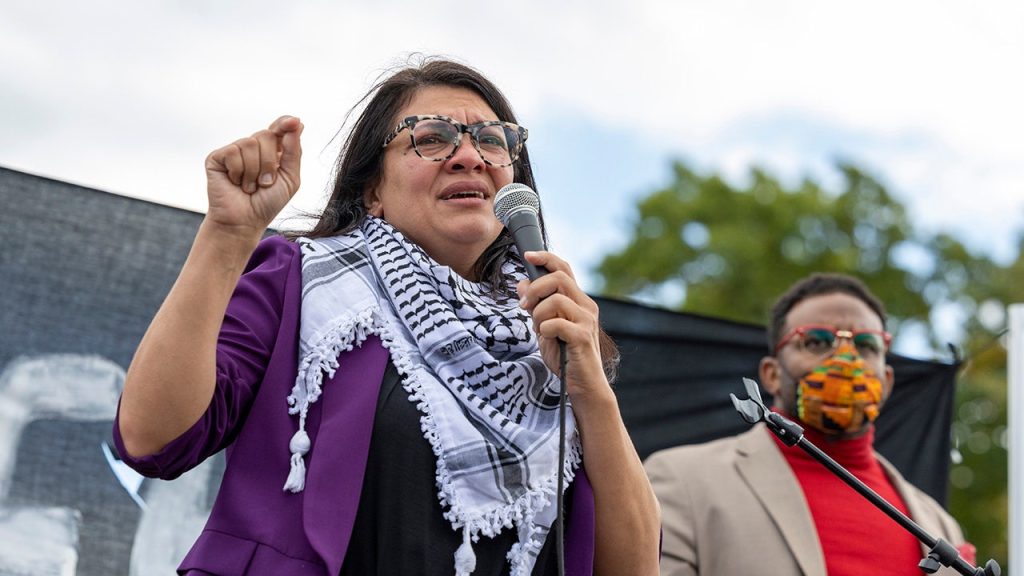Rep. Tlaib’s Passionate Advocacy at Palestinian Conference Highlights Deep Political Divisions
In a powerful display of emotion and advocacy, Democratic “Squad” member Rep. Rashida Tlaib delivered an impassioned speech at the “People’s Conference for Palestine” in Detroit this past weekend, using strong language to criticize U.S. policy toward Israel and Palestine. As the first Palestinian-American elected to Congress, Tlaib’s remarks reflected both her personal connection to the issue and her political stance, declaring to those she termed “genocide enablers” that Palestinian advocates are firmly established in American society and politics. “They thought they could rape us, kill us, violently uproot us from our olive tree farms, starve our children to death, and we would disappear. Well, guess what, now we’re in Congress, and we’re in every corner of the United States,” she proclaimed to an enthusiastic audience, adding that their movement was “just getting started.” Her forceful delivery and choice of words underscored the intense emotions surrounding the ongoing conflict in Gaza and the broader Israeli-Palestinian situation, while also revealing the deep political divisions within American discourse on Middle East policy.
Tlaib’s criticism extended beyond the Israeli-Palestinian conflict to include broader critiques of American political structures, which she characterized as being “built on slavery and genocide and rape and oppression.” This framing places her advocacy for Palestinians within a larger context of what she sees as systemic injustice in American society and foreign policy. Her comments drew parallels between the treatment of Palestinians in Gaza and domestic issues in the United States, suggesting that “what our government is willing to do to Palestinians, they are willing to do to all of you.” By connecting international policy to domestic concerns like healthcare and food assistance programs, Tlaib attempted to build solidarity between the Palestinian cause and other progressive movements in America, framing Gaza as “the compass in this country” for understanding broader political struggles against oppression and inequality.
The three-day People’s Conference for Palestine, organized by multiple pro-Palestinian groups, attracted attention not only for Tlaib’s remarks but also for featuring speakers with what some consider extremist views, including former prisoners released by Israel in a deal with Hamas. The conference opened with ceremonial elements including what was described as “our national anthem” played by a band, while attendees in traditional keffiyehs carried Palestinian flags. The event’s programming and presentation reflected a strong sense of Palestinian national identity and solidarity among participants, creating a space where speakers felt free to express views that might be considered controversial in mainstream American political discourse. Another speaker at the conference, Sachin Peddada, a Ph.D. student and researcher, characterized the United States as “evil” and an “empire” driven by greed, urging the pro-Palestinian movement to “destroy the idea of America in Americans’ heads” to enable people to see beyond what he termed “American exceptionalism and imperialism.”
Tlaib’s outspoken advocacy on this issue has previously drawn significant criticism from colleagues across the political spectrum. In 2023, the House of Representatives voted to censure her for anti-Israel comments made following the outbreak of war between Israel and Hamas. She has also faced backlash for sharing content containing the phrase “From the river to the sea,” a slogan that many pro-Israeli advocates consider to be antisemitic for its implication of eliminating the Jewish state, but which some Palestinian supporters interpret as a call for equal rights throughout the historic Palestine region. These controversies highlight the challenges of discussing the Israeli-Palestinian conflict within American political discourse, where language and symbolism can carry deeply different meanings depending on one’s perspective and background.
The emotional intensity of Tlaib’s speech reflects the personal nature of this issue for many Palestinian-Americans and their supporters, who often feel that Palestinian suffering is overlooked or minimized in mainstream American political conversations. As someone directly connected to the Palestinian experience through her heritage, Tlaib brings a perspective to Congress that was historically absent from deliberations on U.S. Middle East policy. Her election represents a significant milestone for Palestinian representation in American politics, even as her outspoken advocacy generates controversy. The conference provided a platform where such perspectives could be expressed without the constraints often felt in more mainstream political settings, allowing for raw emotional expressions that reflect the trauma and anger felt by many in response to the humanitarian crisis in Gaza.
The divergent reactions to Tlaib’s comments and to the conference itself illustrate the profound polarization in American discussions of the Israeli-Palestinian conflict. While supporters view such advocacy as necessary truth-telling about human rights abuses and colonialism, critics see it as inflammatory rhetoric that oversimplifies a complex geopolitical situation and potentially fuels antisemitism. This polarization has intensified since the October 7th Hamas attack and subsequent Israeli military response in Gaza, with positions hardening on both sides. The conference and Tlaib’s speech represent one perspective within this broader national conversation about American foreign policy, human rights, historical injustice, and the limits of political discourse. As the conflict continues to evolve, these passionate and sometimes contentious debates are likely to remain a significant feature of American political life, reflecting both the global importance of the issue and its deeply personal resonance for many Americans with connections to the region.


